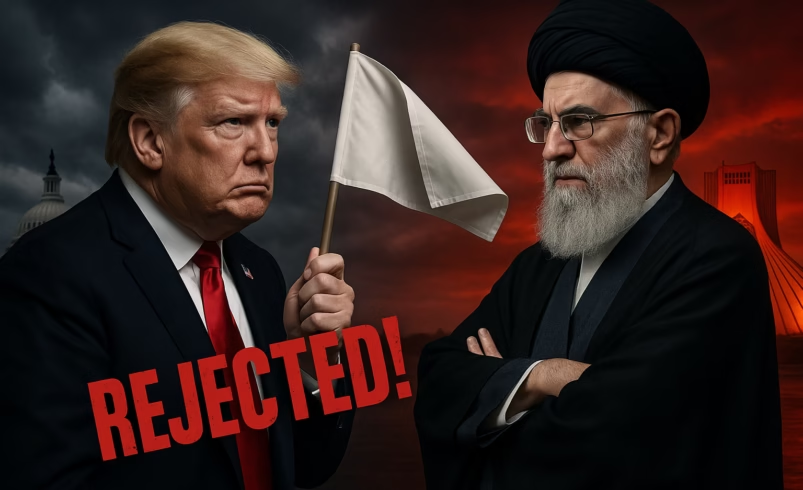Iran Supreme Leader Rejects Trump’s Surrender Plea Amid Escalating Tensions with Israel
- June 18, 2025
- 0
05, ANA Building, Sector 74, Phase 8B, Mohali, Punjab, India - 140308

In a dramatic escalation of rhetoric between Tehran and Washington, Iran’s Supreme Leader Ayatollah Ali Khamenei has forcefully dismissed U.S. President Donald Trump’s call for Iran to surrender to Israel. The statement, released amid mounting regional tensions, signals Tehran’s unwavering position on the Palestinian issue and threatens to further destabilize Middle East diplomacy in 2025.
President Donald Trump, speaking at an American Friends of Israel rally in New York on June 12, 2025, called on Iran to ‘accept reality and stand down’ in its opposition to Israel. His remarks were quickly amplified across global media and drew instant responses from political leaders inside and outside Iran. Trump insisted, ‘The world is changing, and it is time for Iran to accept peace by recognizing Israel’s sovereignty.’
The clash between Tehran and Washington has deepened rifts across the Middle East. Iranian allies such as Hezbollah and Syria quickly echoed Khamenei’s statements, supporting Iran’s steadfastness. Meanwhile, Israeli officials welcomed Trump’s remarks while reiterating their long-time accusations that Tehran fuels regional instability. The Arab League, however, urged restraint. Dr. Noura Al-Masri, a regional analyst, noted, ‘This latest exchange risks undoing months of cautious diplomatic progress in the region.’
Demonstrations broke out in Tehran and several provincial cities following the Supreme Leader’s statement, as crowds chanted slogans rejecting any form of surrender. Social media platforms saw a surge in hashtags like #DefendIran and #NoSurrender, indicating strong domestic backing for Khamenei’s hardline position. Human rights groups have cautioned that internal dissent remains largely suppressed, suggesting that public discourse is tightly controlled despite apparent unity.
This latest war of words comes at a delicate time. Nuclear negotiations brokered by the European Union remain stalled after Iran’s missile test last month, and U.S. sanctions continue to bite the Iranian economy. Analysts warn that such sharp rhetoric reduces the chances for constructive dialogue and increases the risk of escalation. The United Nations Special Envoy for the Middle East, Dr. Marcus Helms, remarked, ‘Both sides must lower the temperature and re-engage in diplomacy if a broader conflict is to be avoided.’
Within hours of Trump’s remarks, Ayatollah Khamenei issued a televised response, calling Trump’s demand ‘arrogant and delusional.’ The Supreme Leader reaffirmed Iran’s long-standing refusal to establish diplomatic ties with Israel and condemned perceived American interference in regional affairs. ‘We will never surrender to illegitimate demands, no matter who voices them—from the White House or otherwise,’ Khamenei declared in front of high-ranking officials in Tehran. His statement reasserted Iran’s commitment to supporting Palestinian rights and resisting what he labelled as Israeli ‘occupation and aggression.’
‘We will never surrender to illegitimate demands, no matter who voices them—from the White House or otherwise.’
— Ayatollah Ali Khamenei
‘The world is changing, and it is time for Iran to accept peace by recognizing Israel’s sovereignty.’
— Donald Trump
‘This latest exchange risks undoing months of cautious diplomatic progress.’
— Dr. Noura Al-Masri
‘Both sides must lower the temperature and re-engage in diplomacy if a broader conflict is to be avoided.’
— Dr. Marcus Helms
As the diplomatic standoff between Iran and the United States intensifies, Ayatollah Khamenei’s outright rejection of Trump’s surrender call underscores the deep-seated divides shaping Middle East politics in 2025. While international leaders urge calm and a return to negotiations, escalating rhetoric on both sides poses challenges to regional stability and highlights the enduring volatility in this critical arena.
Stay informed with the latest developments in global security—subscribe for more breaking news, share your thoughts in the comments, and join the conversation on critical international issues.

